Commentators greeted the Vatican’s new directives regarding Opus Dei’s ecclesial oversight with varying analyses of both their causes and their effects. Here is a sampling:
Eric Sammons
at Crisismagazine.com:
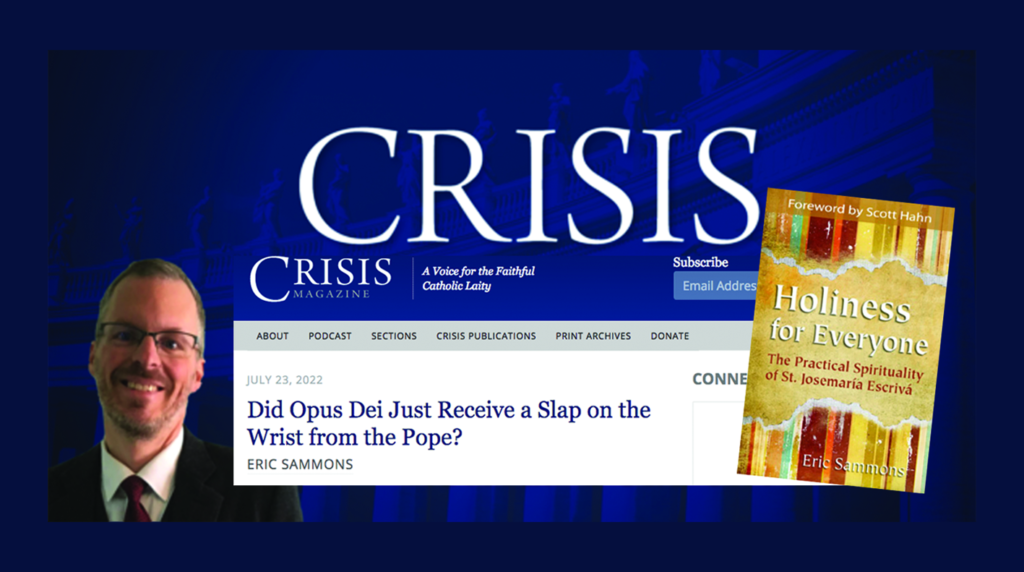
“Most observers see these changes as an ecclesial slap at the prelature, although no one’s really sure why this slap occurred. Opus Dei has always been publicly supportive of Pope Francis, so it’s not like he’s correcting a (perceived) wayward group like his actions directed toward traditional Catholics.
“Speaking of traditional Catholics, I’ve seen more than a few of them a little too happy about this motu proprio. They are noting that even if you are subservient to Francis, he’ll still come after you. I think this attitude misunderstands the work of Opus Dei, as well as shows a certain uncharitableness.
“OR — Now I realize that Opus Dei has a reputation for being ‘conservative,’ and that’s well-deserved. So maybe that’s why this pope is suspicious of them and wants to keep them in check. But if that’s true, then he misunderstands Opus Dei as much as some traditional Catholics do.”
John Allen
at Cruxnow.com:
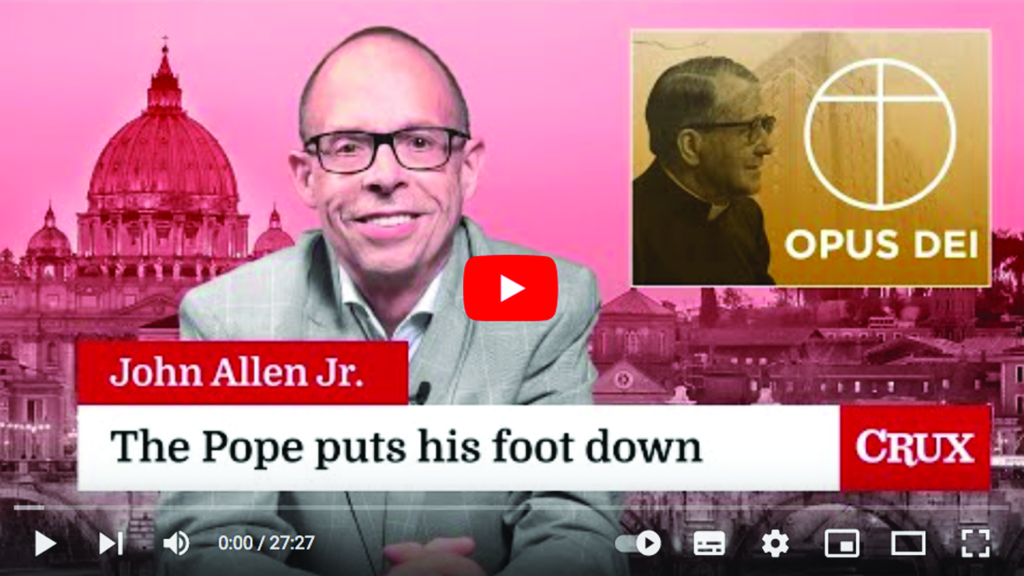
“Though the Pope insisted the changes are intended to protect the founding charism of Opus Dei, in terms of church politics, it’s inevitable that many people will see them as a way of, well, clipping Opus’s wings. […] Opus Dei may not be the 800-pound gorilla under Pope Francis that it was under John Paul, but it’s not going anywhere. Granted, it’s not everyone’s cup of coffee — but then, can you think of any personality or group that matters in the Catholic Church which actually is?”
Fr. John Zuhlsdorf
on Fr. Z’s Blog:
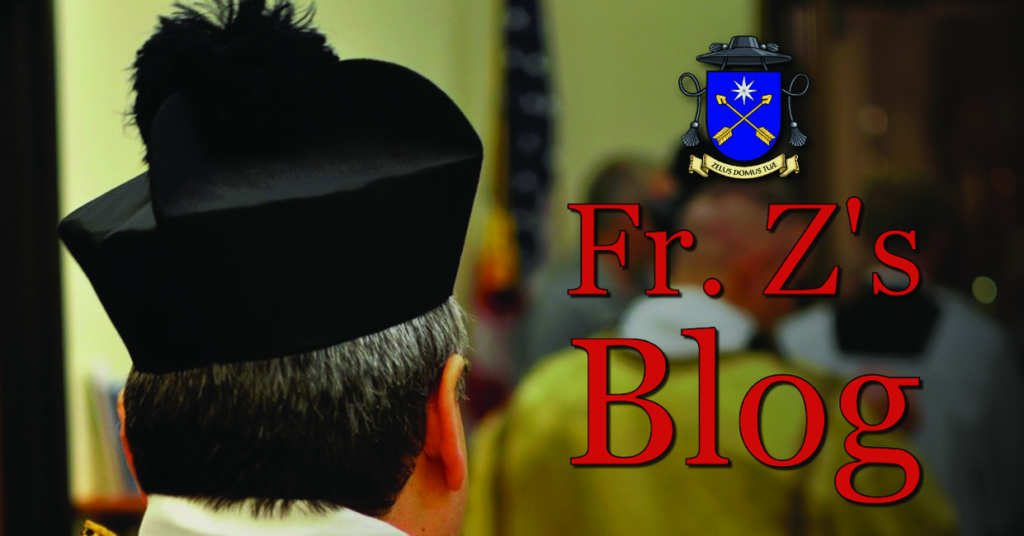
“First, despite the early talk about decentralizing power from Rome, what we have seen again and again is concentration of more and more control in Rome. If this reign of Francis is about anything, it is about centralizing control.
“Second, the structure of the ‘personal prelature’ was often thought of as a solution for traditional groups, including the SSPX. This, therefore, does not bode well for any traditional group. In other news, water is still wet.
“Third, this could also smack of caudillo-like revenge: more and more it seems that members of Opus Dei are not entirely thrilled with all that Francis does.
“Fourth, if there was a suggestion in the texts of the Council that there could be structures like Opus Dei, it seems that the ‘spirit of Vatican II’ disagrees. But you have to have gnosticlike secret knowledge of the ‘spirit of V2’ to manuver through the special accompaniment that Opus Dei is receiving.”
Pedro Gabriel
at wherepeteris.com:
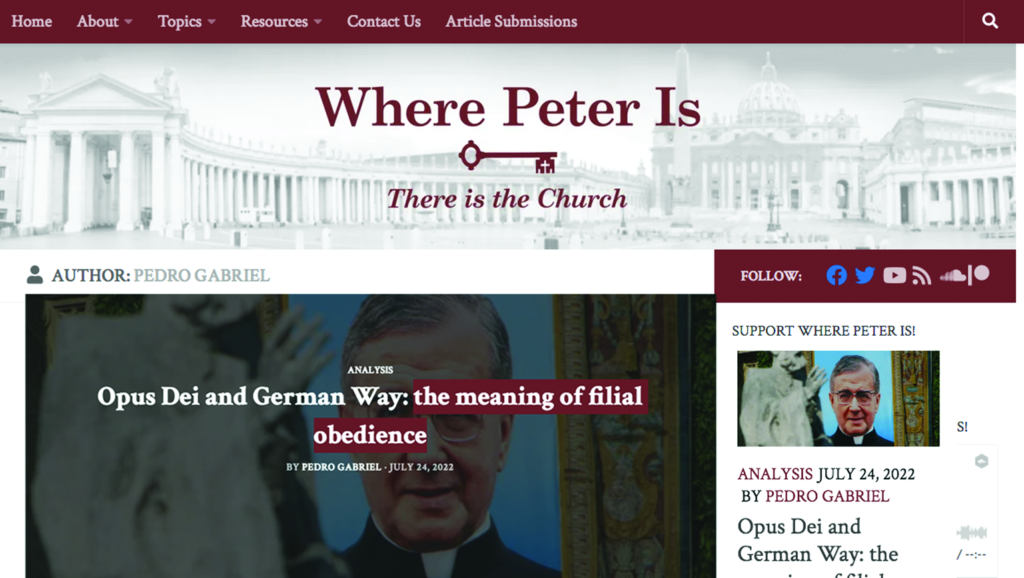
“The reactions from the usual suspects were swift and predictable. Fixated as they are in reading every Church affair through the lens of their own preoccupations, influential online voices of the traditionalist movement are now claiming that this decision was meant to end the possibility of solving the rift between traditionalists and the Holy See by establishing personal prelatures — similar to Opus Dei — for groups like the FSSP, the ICK, or even the SSPX […]
“In their exercise of papal tea leaf-reading, they don’t consider that this decision may actually be connected to the recent reforms of the Roman Curia promulgated through Praedicate Evangelium. They don’t acknowledge the possibility that this resolution may be a way for Pope Francis to help Opus Dei better use their ‘charism’ in the Church, and that it is more concerned with ‘promoting an evangelizing action’ than with ‘hierarchical authority.’ And yet, this is exactly the reasoning Francis gives in Ad charisma tuendum. By seeing this move as a ‘downgrade,’ or a way to preoccupations, influential online voices of the traditionalist movement are now claiming that this decision was meant to end the possibility of solving the rift between traditionalists and the Holy See by establishing personal prelatures — similar to Opus Dei — for groups like the FSSP, the ICK, or even the SSPX […] “In their exercise of papal tea leaf-reading, they don’t consider that this decision may actually be connected to the recent reforms of the Roman Curia promulgated through Praedicate Evangelium. They don’t acknowledge the possibility that this resolution may be a way for Pope Francis to help Opus Dei better use their ‘charism’ in the Church, and that it is more concerned with ‘promoting an evangelizing action’ than with ‘hierarchical authority.’ And yet, this is exactly the reasoning Francis gives in Ad charisma tuendum. By seeing this move as a ‘downgrade,’ or a way to centralize power and control, the Pope’s critics show they have the kind of worldly mindset that Francis seeks to correct.”
Nicolas Dehan in an article on the SSPX website
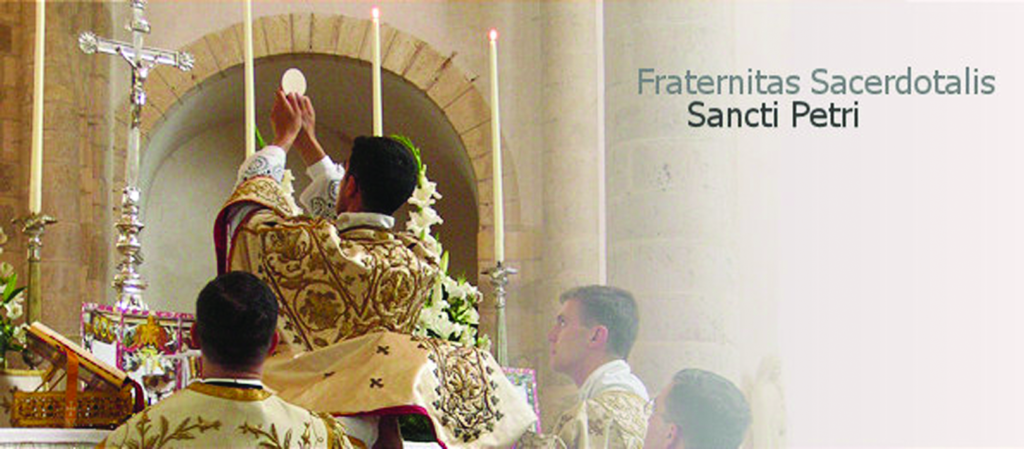
As of this writing, the Society of St. Pius X has not commented specifically on the recent motu proprio, but the website of the American SSPX contains an extensive article by Nicolas Dehan questioning the validity of Opus Dei’s “lay spirituality” and the canonization of its founder, Josemaría Escrivá. In it, Dehan seems to also question the justification for Opus Dei’s head, the Prelate, being ordained a bishop in the first place. Dehan writes:
“In his homily delivered during a Mass of thanksgiving three days after the beatification, Cardinal Sebastiano Baggio, Church Chamberlain, would treat and explicate this: “For the blessed Josemaría Escrivá, unity with the Church is not something external but the very essence of all authentic apostolates. (…) A unity which found its rightful institutional expression in the erection of the Opus Dei into a Personal Prelature and which its Prelate’s ordination to the Episcopacy served to demonstrate how anchored it is to the very source of apostolic unity; [for] the collegiality of bishops — cum Petro et sub Petro — is based on the collegiality of the apostles.”
Dehan concludes: “The ‘pastoral phenomenon’ [of Opus Dei] is the heritage of the apostles. This is what had to be said so as to claim that it was done via apostolic authority.
Letter from Opus Dei’s prelate on Ad charisma tuendum, July 22, 2022
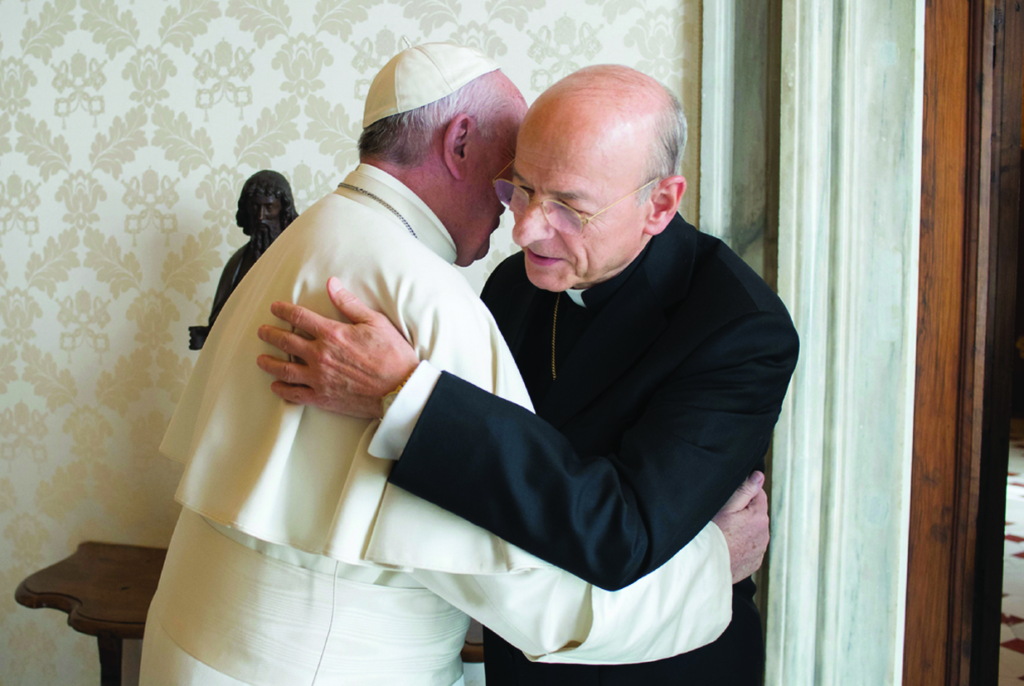
Francis and Fernando Ocariz Brana, head of Opus Dei, on March 4, 2017
My dear children: may Jesus watch over my daughters and sons for me!
This morning the motu proprio of Pope Francis Ad charisma tuendum was made public, which modifies some articles of the Apostolic Constitution Ut sit to adapt them to the norms established by the recent Apostolic Constitution Praedicate Evangelium on the Roman Curia. It is a concretization of the Holy Father’s decision to place the figure of personal prelatures in the Dicastery for the Clergy, which we filially accept.
The Holy Father encourages us to fix our attention on the gift that God gave Saint Josemaría, so as to live it fully. He exhorts us to safeguard the charism of Opus Dei in order “to further the evangelizing action carried out by its members,” and thus “to spread the call to holiness in the world, through the sanctification of one’s work and family and social occupations” (motu proprio “Ad charisma tuendum”). I would like this invitation of the Holy Father to resonate strongly in each and every one of us. It is an opportunity to go more deeply into the spirit that our Lord instilled in our Founder and to share it with many people in our family, work and social environments.
Regarding the provisions of the motu proprio on the figure of the Prelate, I repeat what I have pointed out to you on other occasions: we give thanks to God for the fruits of ecclesial communion that the episcopacies of Blessed Alvaro and Don Javier have brought about. At the same time, the episcopal ordination of the Prelate was not and is not necessary for the guidance of Opus Dei. The Pope’s desire to highlight the charismatic dimension of the Work now invites us to reinforce the family atmosphere of affection and trust: the Prelate must be a guide but, above all, a father.
I also ask you to pray for the work that Pope Francis has asked us to carry out in order to adapt the particular law of the Prelature to the indications of the motu proprio “Ad charisma tuendum,” remaining — as he himself tells us — faithful to the charism.
Your Father blesses you with all his affection,
Fernando Ocariz, 22 July 2022





Facebook Comments